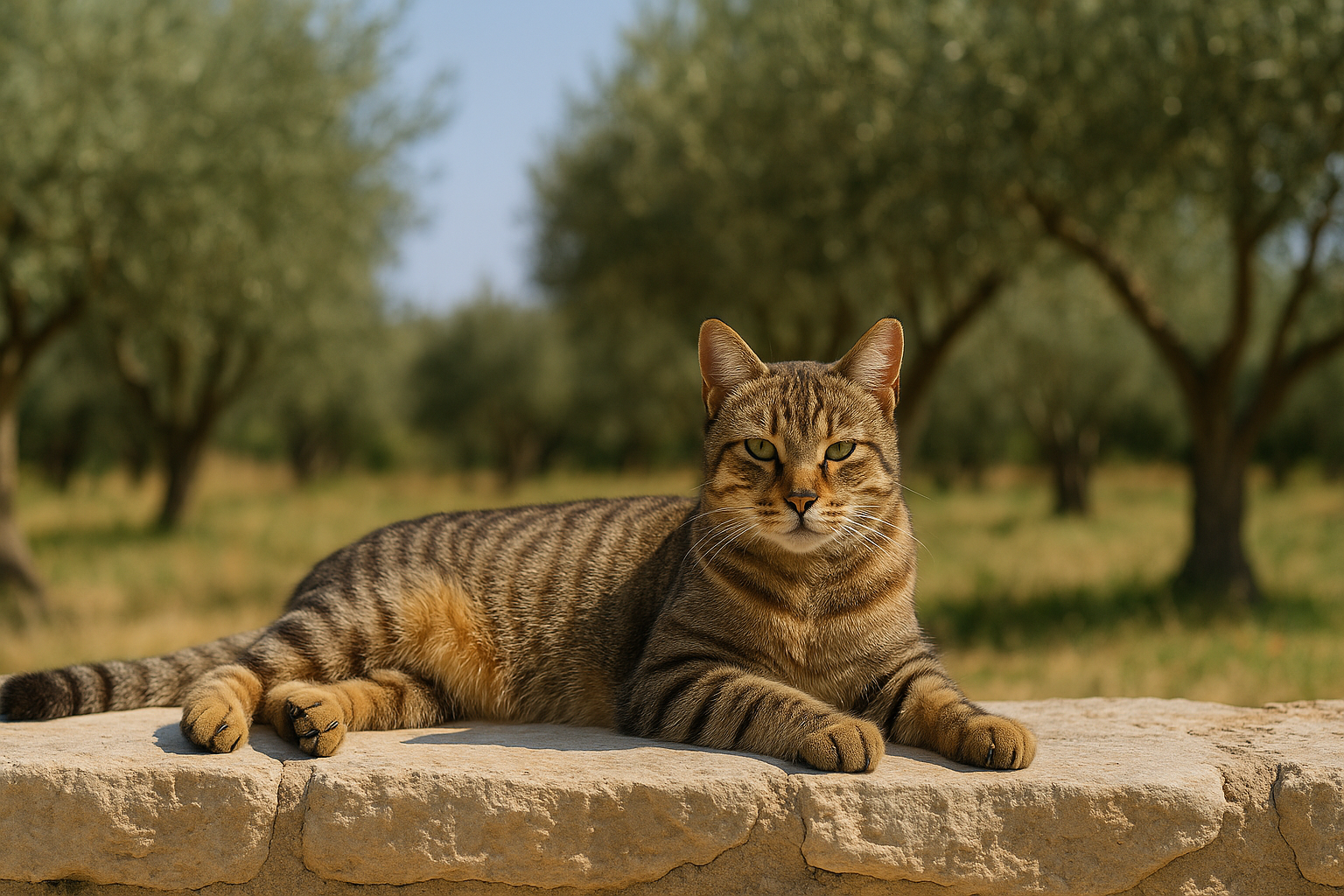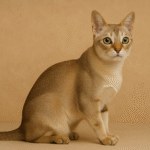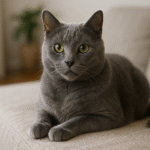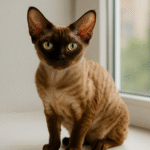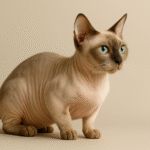The Cyprus Cat is a naturally occurring breed from the Mediterranean island of Cyprus, where it’s lived for centuries among farmers, families, and sun-drenched villages. These cats are known for their adaptability, gentle nature, and weathered, outdoorsy charm—often seen lounging on stone walls or exploring olive groves.
Not as flashy as some pedigree breeds, Cyprus Cats are quiet gems: affectionate, calm, and surprisingly playful when the mood strikes. Whether shorthaired or semi-longhaired, they’re loyal companions that do just as well curled up on your couch as they do basking in the sun. If you’re after a low-maintenance, people-friendly cat with deep island roots, this might be your perfect match.
Quick Breed Facts
- Origin: Cyprus
- Breed registries: WCF (as Aphrodite), GCCF (under review), CFA (not recognized)
- Weight range: 8–16 pounds
- Lifespan: 12–16 years
- Coat: Short or semi-long, dense and weather-resistant
- Colors and patterns: Tabby, solid, bi-color, calico, and more
- Eye color: Green, hazel, copper, or amber
- Grooming: Weekly brushing (more for semi-longhair)
- Activity level: Moderate
- Affection level: High
- Vocality: Low to moderate
- Good with children: Yes
- Good with other pets: Usually, especially if raised together
History & Origin
The Cyprus Cat has been around for a very long time—longer than most modern breeds. In fact, archaeologists have found signs that cats lived alongside people on the island thousands of years ago. Some say they were brought by monks to help with mice in the monasteries. Others believe they arrived through ancient trade routes between Cyprus and Egypt.
What makes the Cyprus Cat special is how naturally it developed. These cats weren’t bred for show—they simply adapted to life on the island. With its rocky hillsides, warm summers, and mild winters, Cyprus shaped a strong, independent, and people-friendly cat. Today, the World Cat Federation recognizes them under the name “Aphrodite Cat,” but locals still see them as the everyday cats of Cyprus—friendly, resourceful, and full of heart.
What Is the Personality of a Cyprus Cat?
Cyprus Cats are the kind of companions who love being near you—but they won’t smother you. They might curl up at your side on the couch, hop up to a windowsill to keep watch, or quietly follow you from room to room just to see what you’re up to. They’re affectionate in a soft, steady way that never feels overwhelming.
Most are easygoing with kids and tend to do well with other pets too, especially when introduced at a young age. Their personalities mix calm confidence with playful curiosity, which makes them a joy to live with whether your home is full of noise or more laid-back. If there’s a sunny spot in your house, don’t be surprised if they claim it first.
Grooming & Shedding
If you’re after a cat that’s easy to care for, the Cyprus Cat won’t let you down. The shorthaired ones are especially low-maintenance—just a quick brushing once a week is usually enough to keep things smooth and tidy. The semi-longhaired variety needs a little more help, with brushing two or three times a week to stay tangle-free and soft.
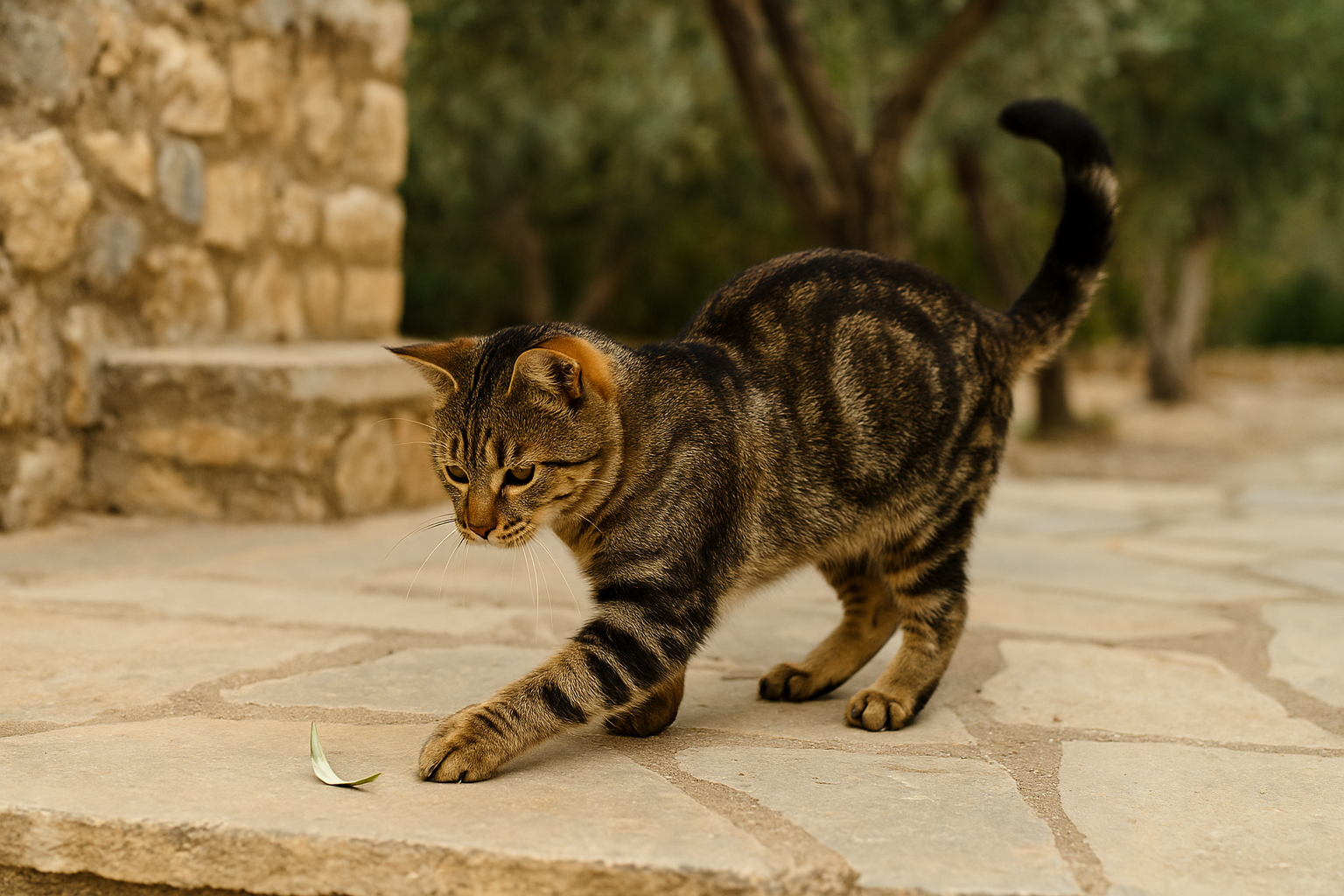
These cats are naturally clean and don’t need frequent baths. Their weather-resistant coats do a good job of repelling dirt on their own. Just add in regular nail trims and dental care, and you’ll have one very polished island cat.
Activity & Play
Cyprus Cats aren’t wild bundles of energy, but they definitely enjoy a good play session—especially if it involves a toy that moves or a high perch with a view. Wand toys, puzzle feeders, and climbing shelves give them a healthy outlet for their curious minds and agile bodies.
They’re natural explorers and love watching the world go by, whether that’s from a windowsill or a spot out in the yard. Indoors, they’ll appreciate a sunny nap as much as a feather chase. Switch up their toys now and then to keep things exciting, and don’t be surprised if they start “helping” with your chores just to be near the action.
Health & Lifespan
Cyprus Cats are tough little survivors. Because they developed naturally over time, they tend to be strong, healthy cats without many breed-specific health problems. Most live a good, long life—usually between 12 and 16 years—and many stay spry and playful well into their senior days.
As with any cat, regular vet checkups, good dental care, and a balanced diet go a long way. Watch their weight, especially if they’re indoor-only. Keeping them active and lean helps prevent common issues like joint strain or diabetes down the road.
Are Cyprus Cats Good with Families?
Absolutely—Cyprus Cats are great with families. They’re patient, gentle, and pretty easygoing, which makes them a good fit for homes with kids, other pets, or a little bit of chaos. Most of them settle in quickly, especially if they’re introduced slowly and given a little space to adjust.
They’re not clingy, but they do love being around their people. If you’re looking for a cat that enjoys your company without being glued to your lap all day, the Cyprus Cat strikes that perfect balance. They might disappear for a nap in the sun, but they’ll be back when it’s time for cuddles.
Nutrition & Diet
Cyprus Cats tend to have good appetites, so it’s important to feed them a diet that keeps them lean and full of energy. Look for food that’s high in animal protein and free from filler ingredients. Wet food is great for hydration, while a bit of dry kibble can help support dental health—just keep an eye on those portions, especially for indoor cats who might not burn it all off.
A mix of wet and dry works well for most Cyprus Cats, as long as meat is the first ingredient. Keep treats to a minimum and make sure they’ve always got access to fresh, clean water. Stick to simple, clean ingredients and your island cat will thrive.
Recommended Supplies
Cyprus Cats aren’t high-maintenance, but they do love having options. A tall cat tree or window perch lets them stretch out and keep an eye on their kingdom. Toss in a sturdy scratching post, a few toys that move, and a cozy bed by the window—and you’ve got a setup they’ll actually use.
These cats have a long history of living freely outdoors—exploring fields, climbing stone walls, and lounging in the sun. If you live in a safe, rural area, your Cyprus Cat may thrive with some supervised or semi-independent outdoor access. In more urban spaces, an enclosed catio or occasional harness walk can help satisfy their adventurous side without the risks of free-roaming. Either way, a sunny perch and a bit of vertical space indoors go a long way.
Final Thoughts
The Cyprus Cat may not be a household name, but it has all the makings of a wonderful companion. These island-born cats are laid-back, loyal, and full of quiet charm. They don’t ask for much—just a sunny spot, some affection, and a little play now and then. Whether shorthaired or semi-longhaired, they’re low-maintenance and full of heart.
If you want a cat that feels like part of the family without being high-strung or overly demanding, the Cyprus Cat is worth a closer look. They’re the kind of cat who finds their favorite window, claims your favorite blanket, and quietly becomes one of the best parts of your day.
Cyprus Cat FAQs
Are Cyprus Cats hypoallergenic?
No—Cyprus Cats are not hypoallergenic. They shed like most cats, although their short coats may be easier to manage with regular cleaning and grooming.
How long do Cyprus Cats live?
Most Cyprus Cats live 12–16 years with proper care. Many remain healthy and active well into their teens.
Do Cyprus Cats need to go outside?
They don’t have to, but they certainly enjoy it. A safe patio, catio, or harness walk gives them a chance to soak up sunshine and satisfy their natural curiosity.
Is the Cyprus Cat the same as the Aphrodite Cat?
Pretty much! The Aphrodite Cat is how some registries, like the WCF, formally recognize them. In Cyprus itself, they’re simply the local cats that have always been part of the island’s story.

